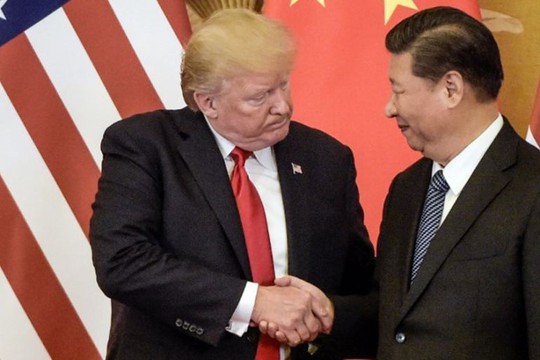President Donald Trump with China's President Xi Jinping. Beijing, 2017
Photo: AFP
China is pushing the Trump administration to roll back national-security restrictions on Chinese deals in the US, dangling the prospect of a massive investment package as part of a proposal that would upend a decade of policy.
The Chinese floated a figure of $1 trillion earlier this year, according to one of the people, but the size of the potential investment being discussed now is unclear, Bloomberg writes.
In addition, President Xi Jinping’s negotiators want the US to lower tariffs on imported inputs used by any Chinese factories built in the US, according to people familiar with the matter, who asked not to be identified discussing private deliberations.
The proposals were raised during trade talks in Madrid last month, the people said. During those meetings, the two sides reached a framework deal to keep Chinese social-media giant TikTok operating in the US, despite national security concerns raised by American lawmakers.
After the Madrid talks, US Trade Representative Jamieson Greer told Fox Business that the two sides had discussed “the investment climate in the United States for Chinese companies.” Senior Chinese trade negotiator Li Chenggang told reporters the US had “expressed its willingness to move together with China toward the same goal when it comes to reducing barriers to investment and promoting relevant cooperation on [the] trade and economic front.”
Days later, Xi urged President Donald Trump in a phone call to create conditions for “Chinese enterprises to invest” in America.
The Chinese proposals are part of a bold set of requests that include pressing the US to change its decades old stance on Taiwan — another red line for Washington. They also represent a shift from trade talks during Trump’s first term that focused on purchases of US exports rather than investment in the US, an area subject to national security reviews.
A White House spokesperson didn’t respond specifically to questions about the talks, saying the administration is focused on ensuring that China is fulfilling its current obligations, an apparent nod to the so-called Phase 1 deal in Trump’s first term. The administration continues to engage with the Chinese to level the playing field for American businesses, farmers, and workers, the official said.
Trump has said he’ll meet Xi at a summit in South Korea this month. Whether the US president will accept China’s offer is unclear — though one of the people said the US hasn’t yet ruled anything out. Questions remain around exactly how much investment China would pledge and the structure of such commitments, although the TikTok framework — American control of a Chinese entity’s US operations — could be one possibility.
Matt Pottinger, a China hawk who served as deputy national security adviser during Trump’s first administration, said allowing a surge of Chinese investment into the US economy would be a major concession to Beijing. “That would be tantamount to the US becoming part of the Belt and Road — indeed, its final destination,” he said, referring to the $1 trillion-plus global infrastructure spending program that China launched in 2013 to bolster its economic and security interests, as well as its political influence.
Trump has repeatedly claimed the US has attracted $17 trillion in commitments since he took office in January. He’s also declared his top priority with China is “frankly, more importantly, a big deal.”
Investment by Beijing of $1 trillion or more would dwarf commitments from other nations. The European Union has committed to $600 billion in investment by its companies over the next four years. Japan has signed on to finance $550 billion in investment into the US, while South Korea is in discussions over the structure of a $350 billion pledge.
Those pledges are arranged differently, with the Japanese one taking the form of a joint fund over which the US has significant discretion. It’s not clear which model any China deal would adhere to.
After hitting a record $57 billion in 2016, Chinese investment in the US has slowed to a trickle, coming in at $2.1 billion for the first half of 2025, according to data on completed deals compiled by Rhodium. After the buying binge, Beijing tightened capital controls, while Washington moved to shut down Chinese deals on national security grounds.
read more in our Telegram-channel https://t.me/The_International_Affairs

 11:05 06.10.2025 •
11:05 06.10.2025 •























